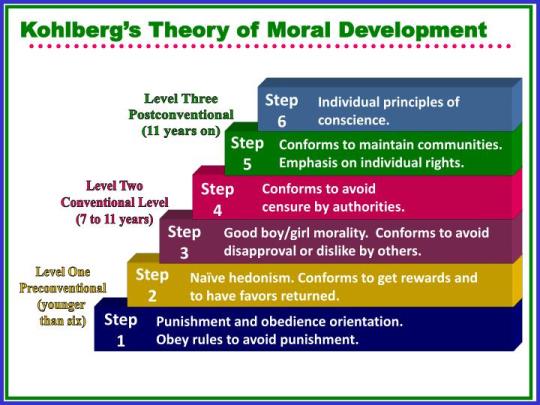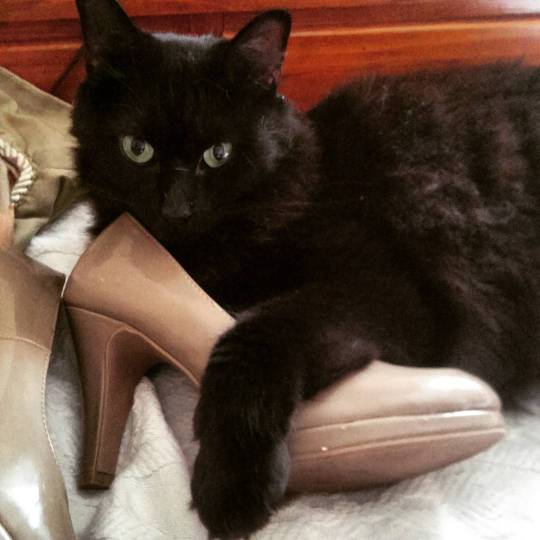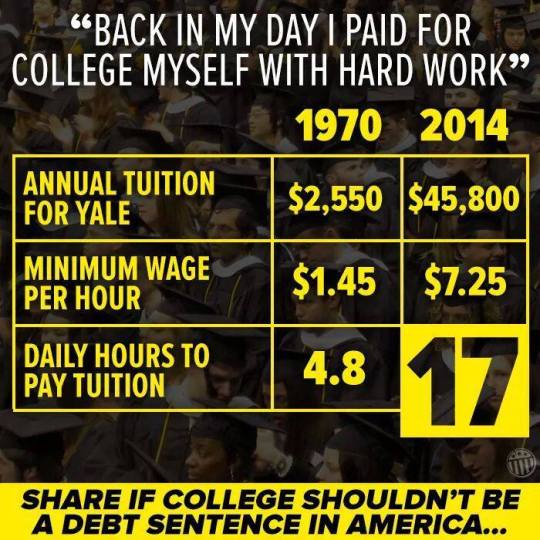Photo

Image Source: Nayef Jihan
Let’s talk about moral development. (No wait, don’t leave! Stick with me.)
Lawrence Kohlberg was a psychologist who specialized in the theory of moral development. His teachings are widely criticized for their misogynistic undertones (as he didn’t believe that women could reason as men do), but the underpinnings are still relevant today.
He posited that humans go through three main levels (two stages to a level) of moral development:
Preconventional: Very little understanding of morality. Basically want to avoid punishment but can’t reason why exactly there are punishments. Dogs and babies can grasp this level.
Conventional: Rely on authority figures (parents, school, government, religion) to assign rules to live by.
Postconventional: Able to reason and develop internal moral compass.
Most people make it to the conventional stage during their school years. They understand that punishment results from breaking the rules, and they inherently accept the authority of those who issue the rules. Initially, the rules are from parents: make your bed, put away your toys, don’t hit your sister. As they get older, they absorb rules from religious leaders (respect your parents or God’ll punish you), teachers (don’t backtalk or you’ll go to the principal’s office), and/or governmental authorities (obey the speed limit or you’ll get a ticket). Kids tend to accept these rules without question, at least until teenage rebellion hits and they start to wonder why they really have to return home by 9pm on a weekend when they don’t even go to bed until midnight.
(Still with me? There’s a point coming up!)
By the time people start to question the rules set by their parents, Kohlberg proposed that most people will start to question other “truths,” kind of like how children learn about the Easter Bunny, Santa, and the Tooth Fairy concurrently. Here’s the problem: we have “moral” authorities that we are conditioned to respect inherently well into adulthood and presumably forever: religious leaders* and law enforcement.
We are seeing an over-reliance on authorities for morality now, in adults. In an interview with The Interrobang, Penn Jillette said:
The question I get asked by religious people all the time is, without God, what’s to stop me from raping all I want? And my answer is: I do rape all I want. And the amount I want is zero. And I do murder all I want, and the amount I want is zero. The fact that these people think that if they didn’t have this person watching over them that they would go on killing, raping rampages is the most self-damning thing I can imagine.
Kohlberg believed that all adults would eventually reach this level of universal morality, knowing that we shouldn’t do bad things because, well, we shouldn’t want to hurt others. We shouldn’t have to rely on an external moral authority (religious or governmental laws) to stop us from doing bad things; we should simply know better. Think of it as the golden rule, but for everything in the world.
I believe that most adults get stuck somewhere between the conventional and postconventional stages. People love to harp on individual rights (I shouldn’t have to wear a face mask! I’m not afraid of getting sick! You’re violating my rights and I am inconvenienced!), believing that they know what’s best for themselves. Unfortunately, they aren’t able to see the bigger picture, that sometimes we have to do things we don’t always want because it’s the right thing to do. Scott Charles posted an excellent example of the sixth stage of moral development to Twitter:
I wear a mask because if the experts are correct, I could potentially prevent someone from getting sick and dying. If the experts are wrong, the most I’m out is the inconvenience of wearing a piece of fabric on my face.
I often wonder who raised some of y’all.
He wears a mask, knowing that it could be violating his individual rights, because he knows that it’s the right thing to do.
This thinking also applies to the Black Lives Matter movement and defunding the police. Jason Lewis, a Minnesotan politician, was recently lambasted on Twitter for retweeting a news article of a black bear wandering in the city and writing, “But by all means, let’s abolish the police! Would love to see a ‘social worker’ take care of this one.” This type of thinking demonstrates an over-reliance on law enforcement as the ultimate authority of community order. If he were to reason just a moment longer, he might realize that there are other community services, such as animal control, who are better equipped than police officers to return a bear safely to the wild.
If people are unable to understand why they should wear a mask in public or how society could happily function without a militarized police force, they have not been able to develop a fully functional moral compass.
* I don’t have a problem with religion in general; rather, I have a problem with people who use their religious beliefs to demean, belittle, or otherwise dehumanize the other (people who don’t ascribe to their flavor of religion).
4 notes
·
View notes
Text
It's the most wonderful time of the year! 🍁
M🍂A 🍞B 🎃O🥧N🍂
get in witches, we’re going baking
381 notes
·
View notes
Photo

Dunbar Landing is uncovered. I'm fortunate my town is far enough above the river that we were mostly unaffected. Imagine this amount of rising waters in someone's home. Now imagine it hundreds of times across the state. That's what we're dealing with here. #wvflood2016 (at Dunbar Landing)
0 notes
Photo

I believe the shovel is in our outbuilding. #winterstormjonas #snow
0 notes
Photo

Snow accumulation of 10 to 16 inches over the weekend. It's still snowing, so I anticipate we'll get closer to 16! #winterstormjonas (at Dunbar, West Virginia)
0 notes
Link
One of the most common complaints I hear about couponing is that it’s never for “real food.” People watch shows like Extreme Couponing and assume that coupons are only good for Gatorade, junk food, and toilet paper. True, most coupons are going to be for processed foods and household goods, but you can do more if you try just a little.
This links to the Rite Aid ad for this week. Let’s focus on the Campbell’s Cream or Condensed Soup deal: 100 Plenti Points when you buy three cans of soup. Plenti Points can be used like cash at Rite Aid, so that’s equivalent to getting $1 off or back for your next purchase, however you prefer to think about it. If you didn’t use any coupons at all, that’s three cans of soup for $2.97, plus $1 back/off. Let’s think of it as a coupon. Three cans of soup for $1.97 means about 66 cents per can. That’s already a great deal, but there’s more.
Rite Aid offers a printable coupon for $1 off when you buy 2 cans of soup. You don’t have to install a special plug-in or anything like that. You don’t have to dig deep into your (nonexistent) pile of coupon inserts to find the right match. Print that online coupon, and you’re getting three cans of soup for $0.97, which is about 33 cents per can!
That is a great deal! There are even healthy options, so you don’t ingest as much sodium if that’s a concern.
Happy Couponing!
1 note
·
View note
Photo

Go State! #wvsuhc15 (at West Virginia State University)
0 notes
Photo

First solo #camping trip (with my #dog Bear) was a success! (at Kanawha State Forest)
1 note
·
View note
Photo

I was going to wear these today, but now I'm not sure I can. She has claimed my shoe. #cats #catsofinstagram
0 notes
Photo
People seemed to respond to my last post on how money really can buy happiness, partly through education. I thought this might be an interesting take on how difficult it can be for an average family--not well-to-do but well above the poverty line--to finance college, and the tuition debt left on the graduate.

In my day, we all took out ridiculous loans to cover our tuition bills.
I posted this image to my Facebook feed, and someone took grave offense to it, commenting that it was absurd to use Yale as a comparison, as it’s one of the most expensive schools in the country. That’s fair. The average person doesn’t go to Yale! For this exercise, I’ve decided to use an average student from Greensboro, NC, going to UNC Greensboro (UNCG) so they can stay at home.
Annie lives with her mom in a two bedroom apartment. She’s decided to major in Computer Science because she wants to graduate job-ready. She knows that she’ll probably need financial aid, but she doesn’t really know where to start. Her mother attended community college but paid out of pocket by attending only a couple evening classes a term.
Her financial aid counselor tells her to file the FAFSA before they can see if she qualifies for anything. Annie’s mother made $35,000 as a medical transcriptionist, which is a bit below the median income for Greensboro ($41,120) but more than double the poverty guideline for their household of two ($15,930). Being this far above the line means that they don’t qualify for any governmental assistance. Annie brought home about $8,000 herself, working close to 20 hours a week at $8 an hour.
The FAFSA tells Annie that she’ll probably qualify for about $2,595 in Pell Grants, and her EFC (Expected Family Contribution) is $3,045 (http://www.finaid.org/calculators/scripts/estimate.cgi). If she doesn’t get any need-based aid from the school, she’ll actually need $3,847 because tuition is $6,442 for the year. Panic-stricken, she calls UNCG and learns that they have a ten-month payment plan, so she’ll only have to come up with $390 (give or take depending on the interest she has to pay to qualify for the payment plan).
Annie’s mom nets about $2,100 a month after taxes and health insurance, and Annie brings in around $550. Their rent is about average, $700, so that’s $1,950 left. She knows her mom spends about $400 a month on groceries for the two of them. Okay, down to $1,550. Her mom bought a used car a couple years ago, and the payment for that and insurance for the both of them is about $300 a month. $1,250. Utilities are close to $300 a month, including internet, and that’s if they aren’t blasting the AC in the summer. $950. The cell phone plan is $90 a month. $860. There’s also the credit card payments of $250. Gas normally costs $150 a month, plus the monthly bus pass for Annie at $58. That leaves $402. Another problem is that Annie’s had to cut her working hours back to 15 a week because of her schedule change and increased academic load, so that’s $150 less a month. That leaves her and her mom just over $250 a month for needs like household necessities and toiletries, medical visits, car problems, or other emergencies. There’s no way. They don’t exactly struggle to make ends meet, but they can’t afford $390 a month plus books and other fees.
Annie learns that UNCG has a fee for freshman orientation - $170. One of her classes is online, which means a $418.47 distance learning charge for that course. Her books are going to cost about $500 for the year, if she’s lucky. She talks with her mom and they decide it would be best to take out the minimum necessary loan payment plus a bit extra for books and other school supplies. She takes $5,000 a year.
Annie graduates with $20,000 of student loan debt, which is less than the average loan debt for NC residents. Her monthly payment will be $230.16 unless she can get income-based or income-contingent repayment.
Poor Annie, in every sense of the word.
#income inequality#student loan debt#why is it so expensive to go to college#i really don't understand
8 notes
·
View notes
Text
I wrote another post! This time, rather than disputing some jerk’s horrible post, I just wrote about something near and dear to my heart: how money can and does buy happiness.
Money can't buy happiness (except that it can)
A number of studies suggest that it does. This adage has been around for as long as I can remember. We have all heard or read anecdotes about how someone had all the money in the world yet remained unsatisfied. One study confirmed that there is a “happiness benchmark” as related to income: about $75,000. Up to that, happiness grows right along with your money. After that, it pretty much levels off.
While I suppose it is true that some people simply can’t find peace (or that some people with no money can), there are a number of things that money can buy that contribute to your well-being.
Money can buy EDUCATION
This one is an interesting cycle. You need money to get into a good college, where you’ll get a good degree, which in turn will give you more money. Family income correlates directly to a child’s college attendance rate, and the quality of that education is also somewhat related, which means more money=higher quality education. Interestingly, the average price of college as a percentage of family income is higher for poorer families and lower for more affluent families. If you have $10 and I have $5, a $1 burger will be 10% of your money but $20 of mine. “Affordable” is relative.
Additionally, People who have higher education make higher incomes and have lower unemployment rates, by and large, so if you can’t get your foot in the educational door, you’re statistically resigned to lower income.
Money can buy SECURITY
Do you know what contributes to happiness? Security. Not worrying if you’re going to lose your house. Not having to decide between groceries or heating. Not being so financially insecure that you’re one accident from destitution. One theorist suggested that financial security is a safety need on Maslow’s hierachy of needs. If you haven’t fulfilled your safety needs, it’s difficult to move to other needs, like affection and self-esteem (see MARRIAGE).
Money can buy HEALTH
You know, stress from not having financial security takes a toll. Generally, people with more money have better overall health. Part of this could be from the constant, prolonged, chronic stress of working to make ends meet, but it could also be about quality of healthcare. Money can afford health insurance, annual visits to the doctor, and emergency trips. You don’t have to wait five days and hope that your whooping cough will just clear up on its own. At this point, people who can’t obtain or afford health insurance are fined, 2% of your income or $325/person, whichever is higher.
Money can buy MARRIAGE
Low income individuals divorce more than their high income counterparts, even though lower income individuals marry less. There are a number of reasons that contribute to this. Could that be because they are constantly stressed about the bills? Maybe one partner spends more than the other considers fair?
Money can buy PERCEPTION
Perception is everything. If you seem to be keeping up with the Joneses, you will feel happier. This phenomenon is what causes even low income individuals to want fancy smartphones and expensive cares.
I guess what I’m saying is that I agree more with Chris Janson when he sings “Money can’t buy happiness / but it can buy me a boat” than with Cher who declares that love will overcome an inability to pay the rent.
What has money gotten you lately?
114 notes
·
View notes
Photo

The official @StrayerUniversity #showcar is here! Our event is from 3pm to 7pm today. #strayer #strayeruniversity (at Strayer University)
0 notes
Photo

How is this my life now? What happened to reading books all day, like everyone thinks #librarians do? I've been deceived! (at Strayer University)
0 notes
Photo

IT sent me a hard drive upside down in its cage. Without a screwdriver, I had to improvise. Fellas, just leave the tech work to the women. We got this. (at Strayer University)
1 note
·
View note
Text
From your librarian, with love
Dear Parents and Guardians,
Do not leave your child at a library. I understand that you believe it's a safe space and that the librarian is competent and able to care for them. Here's the thing: we aren't babysitters. If your child isn't ready to be left at home, they aren't ready to be left alone in a library. We have things to do, and when we have to chase little Billy around to make sure he isn't hurting himself, destroying equipment, or disrupting other patrons, you are detracting from our actual duties.
I'm an academic librarian. Children are not supposed to be on the campus unattended, yet I've had children left to their own (read: our library's) devices at least twice a week over the last few weeks. I love kids and I hate the idea of booting them because I want them to have welcoming experiences in libraries, but students come here to study. Running around, narrating games on the computer, or talking loudly with siblings isn't conducive to learning.
Moreover, we don't operate in loco parentis, which means we can't make decisions on behalf of your child. This applies to medical decisions--like if little Billy hurts himself--as well as to content decisions. If Billy wants to read about things on the computer that he really shouldn't, I'm not likely to intervene because 1) I have no idea if you're actually okay with it, and 2) I'm probably working on something else.
It’s a strange feeling, knowing that you have such little understanding and respect for what I do while simultaneously entrusting the well-being of your children to me. While I don’t want to contribute to the stereotype of an unfeeling, hateful librarian, I do have to uphold some level of decorum.
Signed,
A frustrated academic librarian
23 notes
·
View notes
Photo

This is a pouting #rabbit. He is displeased that I wouldn't let him eat several plastic bags.
0 notes
